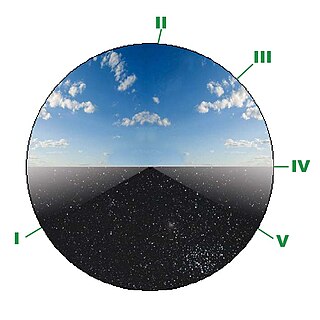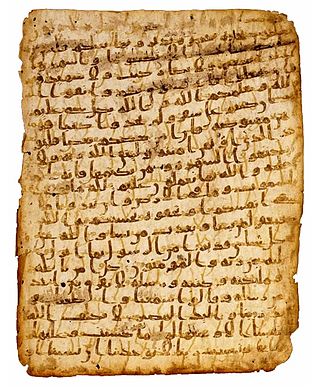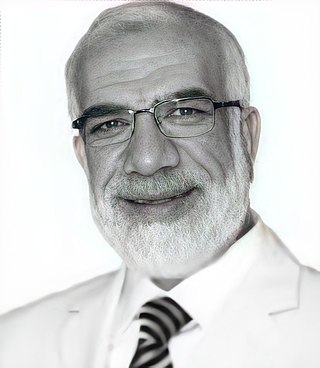In Islam, sunnah, also spelled sunna, are the traditions and practices of the Islamic prophet Muhammad that constitute a model for Muslims to follow. The sunnah is what all the Muslims of Muhammad's time evidently saw and followed and passed on to the next generations. According to classical Islamic theories, the sunnah are documented by hadith, and alongside the Quran are the divine revelation (wahy) delivered through Muhammad that make up the primary sources of Islamic law and belief/theology. Differing from Sunni classical Islamic theories are those of Shia Muslims, who hold that Imams interpret the sunnah, and Sufi who hold that Muhammad transmitted the values of sunnah "through a series of Sufi teachers".

Names of God in Islam are names attributed to God in Islam by Muslims. Some names are known from either the Qur’an or the hadith, while others can be found in both sources, although most are found in the Qur’an.

The Quran, also romanized Qur'an or Koran, is the central religious text of Islam, believed by Muslims to be a revelation from God. It is organized in 114 chapters, which consist of verses. In addition to its religious significance, it is widely regarded as the finest work in Arabic literature, and has significantly influenced the Arabic language.
Ashʿarism or Ashʿarī theology is one of the main Sunnī schools of Islamic theology, founded by the Arab Muslim scholar, Shāfiʿī jurist, reformer (mujaddid), and scholastic theologian Abū al-Ḥasan al-Ashʿarī in the 9th–10th century. It established an orthodox guideline, based on scriptural authority, rationality, and theological rationalism.

Translations of the Qurʻan are considered interpretations of the scripture of Islam in languages other than Arabic. The Qurʻan was originally written in the Arabic language and has been translated into most major African, Asian and European languages.
ʻAbd al-Majīd, also spelled as Abd ul Majid, Abd ul-Majid, Abd ol Majid, Abd ol-Majid, and Abdolmajid, is a Muslim male given name and, in modern usage, surname. It is built from the Arabic words ʻabd and al-Majīd, one of the names of God in the Qur'an, which give rise to the Muslim theophoric names. It means "servant of the All-glorious". It is rendered in Turkish as Abdülmecid.
An-Nisa' is the fourth chapter (sūrah) of the Quran, with 176 verses (āyāt). The title derives from the numerous references to women throughout the chapter, including verse 34 and verses 4:127-130.
Naskh is an Arabic word usually translated as "abrogation". In tafsir, or Islamic legal exegesis, naskh recognizes that one rule might not always be suitable for every situation. In the widely recognized and "classic" form of naskh, one ḥukm "ruling" is abrogated to introduce an exception to the general rule, but the text the ḥukm is based on is not repealed.

Al-Fajr is the eighty-ninth chapter (sura) of the Quran, with 30 ayat or verses. The sura describes destruction of disbelieving peoples: the Ancient Egyptians, the people of Iram of the Pillars, and Mada'in Saleh. It condemns those who love wealth and look with disdain upon the poor and orphans. Righteous people are promised Paradise – the final verse says "And enter you My Paradise!". The Surah is so designated after the word wal-fajr with which it opens.
Keith Leon Moore was a professor in the division of anatomy, in the faculty of Surgery, at the University of Toronto, Ontario, Canada. Moore was associate dean for Basic Medical Sciences in the university's faculty of Medicine and was Chair of Anatomy from 1976 to 1984. He was a founding member of the American Association of Clinical Anatomists (AACA) and was President of the AACA between 1989 and 1991.
Abdul Majeed al-Zindani is a leading Islamist, founder and head of the Iman University in Yemen, head of the Yemeni Muslim Brotherhood political movement and founder of the Commission on Scientific Signs in the Quran and Sunnah, based in Saudi Arabia. He has been described by Daniel Golden of the Wall Street Journal as "a charismatic Yemeni academic and politician." and by CNN as "a provocative cleric with a flaming red beard".

The splitting of the Moon is a miracle in the Muslim faith attributed to the Islamic prophet Muhammad. It is derived from Surah Al-Qamar 54:1–2 and mentioned by Muslim traditions such as the asbāb al-nuzūl.
A number of terms are used in Islam to refer to the claims of events happening that are not explicable by natural or scientific laws, subjects where people sometimes invoke the supernatural. In the Quran the term āyah refers to signs in the context of miracles of God's creation and of the prophets and messengers. In later Islamic sources miracles of the prophets were referred to by Muʿjiza (مُعْجِزَة), literally meaning "that by means of which [the Prophet] confounds, overwhelms, his opponents"), while miracles of saints are referred to as karamat (charismata). I'jaz al-Quran – literally the inimitability of the Quran – refers to the Quranic claim that no one can hope to imitate its perfection, this quality being considered the primary miracle of the Quran and proof of Muhammad's prophethood. In recent decades, the term I'jaz has also come to refer to the belief that the Quran contains "scientific miracles", i.e. prophecies of scientific discoveries. Kharq al'adad – "a break in God's customary order of things" – was a term used in "theological or philosophical discussions" to refer to miraculous events. Karamat – "gifts or graces" – was usually used for miraculous performances of Sufi saints often used to convert unbelievers to Islam.
Muslim scholars have developed a spectrum of viewpoints on science within the context of Islam. The Quran and Islam allows much interpretation when it comes to science. Scientists of medieval Muslim civilization contributed to the new discoveries in science. From the eighth to fifteenth century, Muslim mathematicians and astronomers furthered the development of almost all areas of mathematics. At the same time, concerns have been raised about the lack of scientific literacy in parts of the modern Muslim world.
Miracles of Muhammad are miraculous happenings attributed to the Islamic prophet Muhammad.

Islamic holy books are certain religious scriptures that are viewed by Muslims as having valid divine significance, in that they were authored by God (Allah) through a variety of prophets and messengers, including those who predate the Quran. Among the group of religious texts considered to be valid revelations, the three that are mentioned by name in the Quran are the Tawrat, received by prophets and messengers amongst the Children of Israel; the Zabur (Psalms), received by David; and the Gospel, received by Jesus. Additionally, the Quran mentions God's revealing of the Scrolls of Abraham and the Scrolls of Moses.

Zaghloul Ragheb Mohammed Al Naggar, also known as Zaghloul El-Naggar, is an Egyptian geologist, Muslim scholar, and author. The main theme of El-Naggar's books has been science in Quran; his philosophy of science is blended with religion. He left his academic career to become the Chairman of Committee of Scientific Notions in the Qur'an, Supreme Council of Islamic Affairs, Cairo, Egypt.

Mohammed Rateb Al-Nabulsi is a Syrian writer, professor, Islamic scholar, and Co-founder & manager. He was a professor at Damascus University. He was living in Syria but after the Syrian Revolution started in 2011, he went to Jordan.
Quranism or Qur'anism is an Islamic movement that holds the belief that divine law should be derived solely from the Quran.

Omar Abdul-Kafi is an Egyptian writer, who is known for his books, lectures on TV. He has a YouTube channel with over 8.97 million subscribers.








